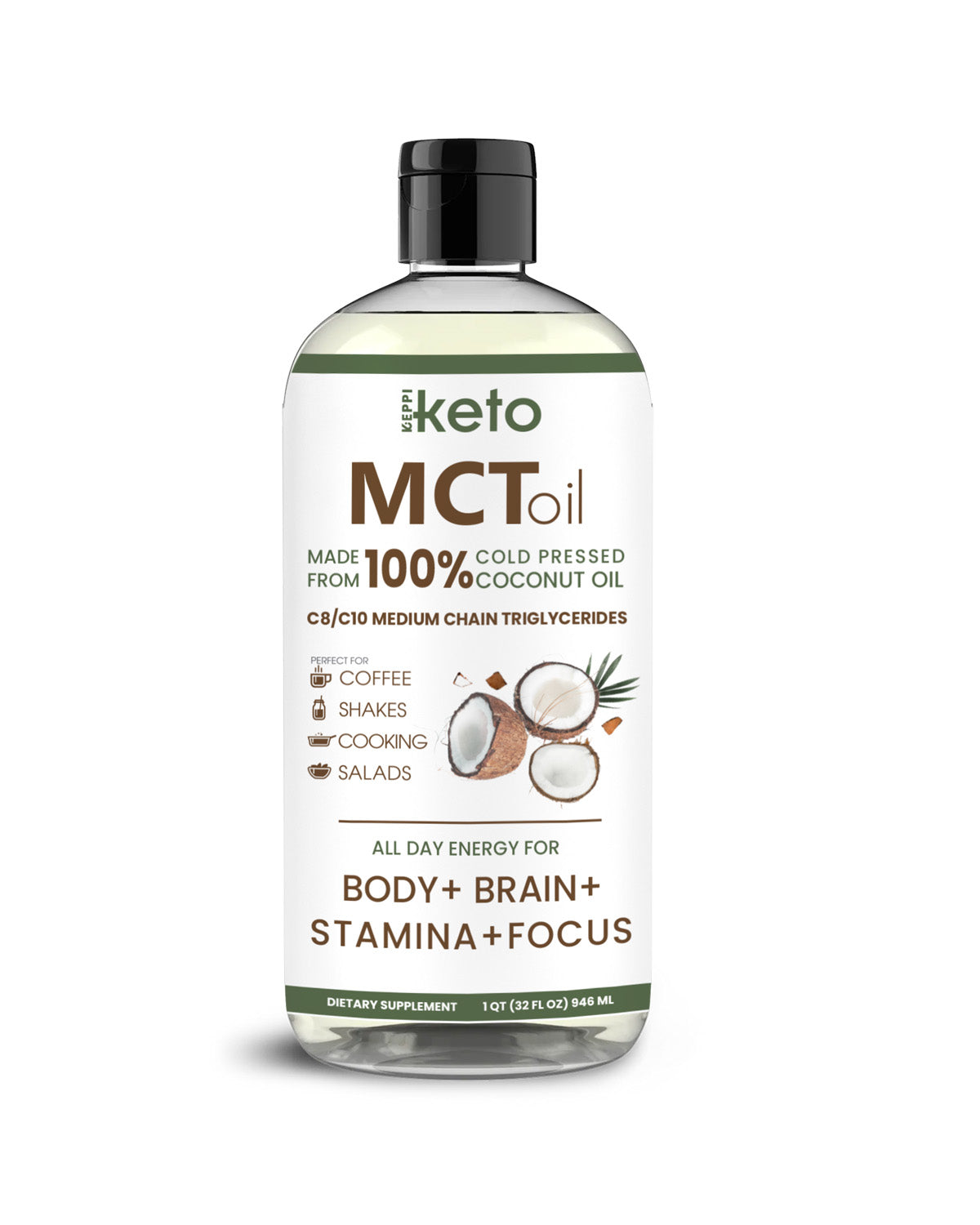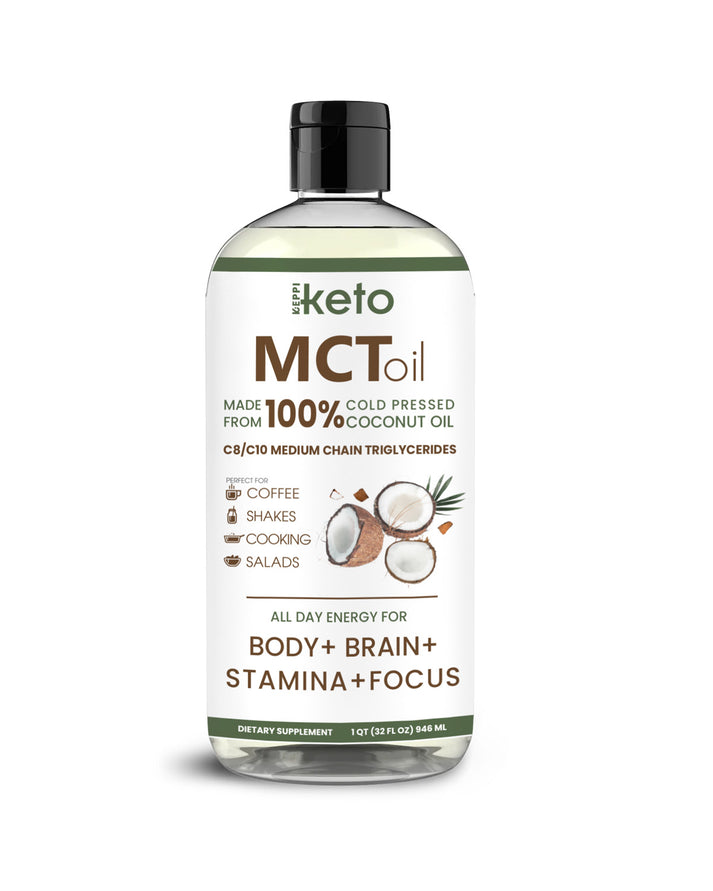Keto Flu to Focus: The Evidence-Based Supplement Stack That Works
Share
Why Keto Needs a Supplement Strategy
Primary SEO targets: best supplements for keto, keto electrolytes, MCT oil C8 C10, sugar-free electrolyte powder, creatine monohydrate, omega-3, low-carb diet, Keppi MCT Oil, Keppi Electrolytes.
You’ve trimmed carbs, loaded up on healthy fats, and feel ready to roll—so why does day three hit like a brick wall? That foggy head, cramping calves, and plummeting gym numbers highlight the real problem: nutrient gaps. This pain point shows up because ketosis shifts water, electrolytes, and key minerals out of balance, creating an early-stage challenge that can stall results (Phinney and Volek, 2012; Institute of Medicine, 2005).
This overview walks through each supplement’s role, ideal timing, and smart stacking methods. By the finish, you’ll identify red flags on labels and feel confident tailoring your own protocol. Use the guide like a menu—choose what you need, skip what you don’t. Let’s set the foundation for a smoother, stronger keto beginning.
What You'll Learn — What are the best supplements to take on the keto diet?
- The science behind keto-induced nutrient shortfalls (Phinney and Volek, 2012).
- The vitamins and minerals most likely to slip away (Institute of Medicine, 2005).
- Gym-friendly boosters that respect fat adaptation.
- Timing moves that tame keto flu fast (Sawka et al., 2007).
- Label clues that separate quality from hype.
TL;DR: Smart Supplement Strategies on Keto
To thrive on keto, prioritize a keto electrolytes stack—magnesium, sodium, potassium—to beat keto flu. Add MCT oil (C8 C10) for quick ketone energy, omega-3s for inflammation balance, and creatine monohydrate to protect strength. Focus on dose, purity and clean, sugar-free formulas for best results (Institute of Medicine, 2005; Kreider et al., 2017; St-Onge and Jones, 2002).
Learn more about Keppi MCT OilWhat Are the Best Education Topics Related to Keto Supplements?
- Magnesium – muscle calm, nerve support, sleep stability during carb restriction (de Baaij et al., 2015).
- Electrolyte Salt Blend – replaces sodium and potassium to curb the keto flu (Institute of Medicine, 2005; Sawka et al., 2007).
- MCT Oil – rapid ketone source that steadies energy and focus (St-Onge and Jones, 2002).
- Omega-3 Fatty Acids – counterbalance inflammation in a high-fat plan (Calder, 2017).
- Creatine Monohydrate – preserves strength when glycogen runs low (Kreider et al., 2017).
Magnesium — Why It Tops Keto Supplement Lists
Early ketosis pushes water and minerals out fast; magnesium is among the first to slide. You need it for smooth muscle contraction, steady mood, and restorative sleep. Grain and fruit limits can shrink intake, so targeted supplementation closes this gap without shifting macros (de Baaij et al., 2015; Institute of Medicine, 2005).
- 200–400 mg elemental magnesium daily suits most adults (NIH ODS, 2022).
- Citrate or glycinate forms absorb well and stay gentle on digestion (NIH ODS, 2022).
- Taking it in the evening may support sleep quality.

Electrolyte Salt Blend — The Keto Flu Fix
Lower insulin during carbohydrate restriction reduces renal sodium reabsorption, and potassium often follows—one reason headaches and cramps flare in week one (Institute of Medicine, 2005; Phinney and Volek, 2012). Replacing both minerals addresses the root cause. Keppi Electrolytes use a balanced, sugar-free electrolyte powder approach so you can maintain fluid balance without hidden carbs.
- Helps maintain blood pressure and performance during adaptation (Sawka et al., 2007).
- Supports nerve conduction and muscle rhythm (MedlinePlus, 2024).
- Single-serve packets simplify travel and on-the-go hydration.
“Electrolytes are essential for balancing hydration, aiding muscle function and keeping energy steady, especially when starting keto. Consistency helps you dodge cramps and brain fog.”
MCT Oil (C8 C10) — Fast Ketone Energy
MCT oil skips much of normal fat digestion, travels to the liver and raises circulating ketones quickly—useful for morning focus or fasted training (St-Onge and Jones, 2002; Courchesne-Loyer et al., 2013). Keppi MCT Oil features pure C8/C10 for efficient conversion and clean energy that doesn’t spike glucose.
- Start at 1 tsp to gauge tolerance; build to 1–2 Tbsp.
- Mix into coffee, shakes or dressings; neutral taste eases adherence.
- Great for long work blocks and pre-training fuel.
Omega-3 Fatty Acids — Balance the High-Fat Plan
EPA and DHA help counter an omega-6 heavy intake, supporting cardiometabolic markers and inflammatory balance (Calder, 2017; Abdelhamid et al., 2018). They’re a smart add to a low-carb diet that leans on packaged fats.
- Aim for ~250–500 mg EPA+DHA/day from fish oil (EFSA, 2012).
- Look for third-party testing for purity and oxidation.
- Coordinate with clinicians if using anticoagulants.
Creatine Monohydrate — Strength Without Carbs
Creatine stores high-energy phosphate in muscle so you can push hard even with lower glycogen. Decades of data support 3–5 g/day of creatine monohydrate for strength, lean mass and recovery (Kreider et al., 2017). It may also support aspects of cognition.
- Consistency over timing—mix with any water-based drink daily.
- Stay hydrated to support cellular transport.
- Most effective and economical form remains monohydrate.
Together, these five supplements create a focused strategy that fills nutrient gaps, reduces adaptation hurdles and broadens your understanding of keto physiology. Use the insights here as a framework and adjust based on personal response.
Fast, Clean Fuel for Steady Keto Momentum
When energy dips, keto-flu symptoms and stalled fat loss hit, Keppi MCT Oil provides rapid ketones for steady focus and stamina.
This solution relies on a premium C8/C10 blend that bypasses lengthy digestion, raises blood ketones within minutes and supports appetite control—without sugar (St-Onge and Jones, 2002; Courchesne-Loyer et al., 2013).
Implementation Steps for Consistent Results
- Set your baseline: log times of low focus to time your first dose.
- Start small: 1 tsp in morning coffee; assess GI comfort.
- Scale strategically: up to 1–2 Tbsp/day, split AM + pre-training.
- Measure the payoff: track energy, focus and appetite for 2 weeks; refine serving size.
Keppi C8 C10 MCT Oil – Rapid Energy for Keto

Keppi C8 C10 MCT Oil
100% non-GMO coconut-derived, palm-free. Pure C8/C10 supports fast ketone production for clean energy. Blends invisibly into coffee, shakes or salads.
Key Features that Reinforce the Remedy
- Neutral taste and odor for effortless daily use.
- Non-GMO coconuts align with whole-food values.
- GMP-certified production for reliable C8/C10 ratios.
Conclusion
You’ve covered how magnesium, keto electrolytes, MCT oil, omega-3s, and creatine monohydrate plug nutrient gaps, ease keto flu and keep training on track. Set a simple routine, choose clean, evidence-based doses and iterate based on personal response.
At Keppi, we rely on our C8/C10 MCT Oil and Electrolytes for fast ketone energy and balanced hydration. A tablespoon and a stick pack can turn tomorrow’s focus—and your keto diet momentum—around.
References
- Calder, P.C. (2017) Omega-3 fatty acids and inflammatory processes: from molecules to man. Biochemical Society Transactions, 45(5), 1105–1115.
- Courchesne-Loyer, A. et al. (2013) Stimulation of mild, sustained ketonemia by medium-chain triacylglycerols in healthy humans. Nutrition, 29(4), 653–658.
- de Baaij, J.H.F., Hoenderop, J.G.J. and Bindels, R.J.M. (2015) Magnesium in man: implications for health and disease. Physiological Reviews, 95(1), 1–46.
- EFSA (2012) Scientific Opinion on Dietary Reference Values for fats, including saturated fatty acids, polyunsaturated fatty acids, monounsaturated fatty acids, trans fatty acids, and cholesterol. EFSA Journal, 10(3), 281.
- Institute of Medicine (2005) Dietary Reference Intakes for Water, Potassium, Sodium, Chloride, and Sulfate. Washington, DC: National Academies Press.
- Kreider, R.B. et al. (2017) International Society of Sports Nutrition position stand: safety and efficacy of creatine supplementation. Journal of the International Society of Sports Nutrition, 14, 18.
- MedlinePlus (2024) Electrolytes: What they are and how they’re measured. U.S. National Library of Medicine. Available at: https://medlineplus.gov/lab-tests/electrolytes/
- NIH Office of Dietary Supplements (2022) Magnesium Fact Sheet for Health Professionals. Available at: https://ods.od.nih.gov/factsheets/Magnesium-Consumer/
- Phinney, S.D. and Volek, J.S. (2012) The Art and Science of Low Carbohydrate Performance. Beyond Obesity LLC.
- Sawka, M.N. et al. (2007) ACSM position stand: Exercise and fluid replacement. Medicine & Science in Sports & Exercise, 39(2), 377–390.
- St-Onge, M.P. and Jones, P.J.H. (2002) Physiological effects of medium-chain triglycerides: potential agents in the prevention of obesity. The Journal of Nutrition, 132(3), 329–332.
- Abdelhamid, A.S. et al. (2018) Omega-3 fatty acids for the primary and secondary prevention of cardiovascular disease. Cochrane Database of Systematic Reviews, 11:CD003177.
